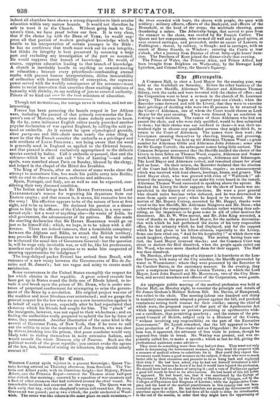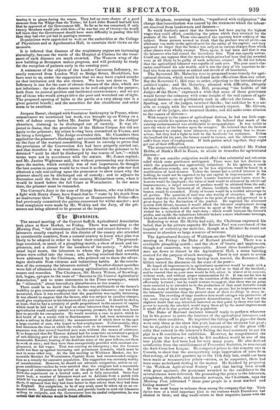She ltlEttopolfs.
A Common Hall, to elect a Lord Mayor for the ensuing year, was held at the Guildhall on Saturday. Before the other business of the day, the new Sheriffs, Alderman W. Hunter and Alderman Thomas Sidney, took the oaths and were invested with the chains of office ; and the Corporation went to hear a sermon in the church of Si. Laurence Jewry. The election began at a quarter past one o'clock ; when the Recorder came forward and told the Livery, that they were to exercise their privilege of deciding who were two fit persons to be returned to
the Court cf Aldermen, one of whom the Court would choose as Lord Mayor for the year ensuing. They were fettered by no condition in coming to such decision. The names of those Aldermen who had not passed the chair, and who were duly qualified, would be first submitted to them ; but their choice was not confined to these—it was their un- doubted right to choose any qualified persons they might think fit, to return to the Court of Aldermen. The names were then read ; the Liverymen amusing themselves by cheering, hissing, and groaning. "A forest of hands" was held up for Alderman Thomas Wood ; a great number for Alderman Gibbs and Alderman John Johnson ; some also for Sir George Carroll; the subsequent names being little noticed. The Common Sergeant announced that the Sheriffs decided the choice of the Livery to have fallen on Thomas Wood, esquire, Alderman and frame- work-knitter, and Michael Gibbs, esquire, Alderman and fishmonger. The Lord Mayor and Aldermen retired, and remained absent for about half an hour. On their return, the Recorder declared that the election of the Court had fallen on Michael Gibbs, esquire ; an announcement which was received with loud cheers, hootings, hisses, and groans. The Lord Mayor elect, who was greeted with cries of " Walbrook 1" ad- dressed the meeting ; but could not make his voice heard in the tumult. Alderman Thomas Wood succeeded in speaking above the uproar. He thanked the Livery for their support; for the show of hands was un- paralleled in the history of civic elections. He were a poor general who should retire because twice defeated, and he was determined to meet them again next year ; when he hoped to be elected. On the motion of Mr. Deputy Corney, seconded by Mr. Heppel, thanks were voted to the late Sheriffs, Mr. Alderman Musgrove and Mr. Moon ; who acknowledged the compliment ; the confusion rather waxing than sub- siding, as the impatience to be gone came in aid of other motives for discontent. Mr. D. W. Wire moved, and Mr. John King seconded, a vote of thanks to the present Lord Mayor, for the uniform determina- tion with which he had performed the duties of his very responsible office, for the urbanity which he had displayed, and for the support which he had given to his fellow-citizens, especially to the Livery. Some one here cried out, "And for his hospitality !" at which there was much laughter, cheering, and hissing. The motion having been car- ried, the Lord Mayor returned thaliks; and the Common Crier was about to declare the Hall dissolved, when the people again called out Mr. Wood, who once more thanked them for their support. The Hall was then dissolved.
On Monday, after partaking of a dejeuner a la fonrchette at the Lon- don Tavern with many of the City notables, the Sheriffs proceeded by water to Westminster ; where they were presented by the Recorder to the Cursitor Baron, in the customary manner. In the evening, they gave a sumptuous banquet at the London Tavern ; at which the Lord Mayor, Lord John Russell and Mr. Masterman two of the City Mem- bers, and several members and officers of the Corporation, were guests.
An aggregate public meeting of the medical profession was held at Exeter Hall, on Monday night, to consider the principle and details of Sir James Graham's Medical Reform Bill. Mr. Davies, of Hampstead, was called to the chair. The meeting (about one hundred and thirty in number) unanimously adopted a protest against the bill, and pendent resolutions setting forth reasons for their oislike; among the chief of which were, the proposed repeal of that part of the Apothecaries Act which imposes penalties on persons practising as apothecaries with- out a certificate, thus permitting quackery ; and the nature of the pro- posed Council of Health, subject only to a Minister of the Crown, "without involving any responsibility on the part of the Executive Government." Dr. Lynch remarked, that the bill appeared to be the joint production of a Free-trader and an Oligarchist : Sir James Gra- ham was, it appeared, the advocate of free trade in poison, though he opposed free trade in bread. Mr. Wakley was present, and was re- peatedly called for, to make a speech ; which at last he did, giving the professional audience some advice— They must do something more than they had yet done. They must not only unite in denouncing the Government measure, but they must be prepared with a measure of medical reform to substitute for it. How could they expect Go- vernment could frame a good measure on the subject, if those who were so much better able by their education and pursuits to do so bung back and neglected their duty ? He had been asked, why he had not himself introduced a bill ? His answer was, because he knew if he had it would have injured the profession. He should have had no chance of carrying it ; and a vote of Parliament against a good bill would be fatal to its after success. Be had heard of this bill Wore it appeared. He had beard, too, that it was sanctioned by the Corege of Physicians of Edinburgh, by the Faculty of Medicine of Glasgow, pod by the Colleges of Physicians and Surgeons of London ; while the Apotheiaries Com- pany and the head of the medical practitioners in this country bad not been consulted upon it at all. He bad therefore not pressed the Government with questions upon the subject, but had done all he could to delay its introduction to the end of the session, in order that they might have the opportunity of
tearing it to pieces during the recess. They bad no more chance of a good measure from the Whigs than the Tories; for Lord John Russell had told him that he approved of the Government bill. So far as he was concerned, if only twenty Members would join with him—if he was but one of twenty—he would tell them that the Government should have more difficulty in passing this bill than they had ever yet bad in passing a measure.
Deputations were appointed to wait on the authorities at the College of Physicians and at Apothecaries Hall, to ascertain their views on the measure.
It is inferred that diseases of the respiratory organs are increasing alarmingly, because the wards of the Hospital at Chelsea for the treat- ment of such diseases are much crowded. The Western wing of the new building at Brompton makes progress, and will probably be ready for the reception of patients early in the ensuing year.
A statement of the objects of the London Cutaneous Infirmary, re- cently removed from London Wall to Bridge Street, Blackfriars, has been sent to us, under the supposition that we may have copied attacks on that institution and the site chosen. We have not done so. The Infirmary is one for the care of chronic diseases of the skin, which are not infectious : the site chosen seems to be well adapted to the purpose, both from its central position and incidental conveniences ; and we are not of those who would always drive the poor and wretched out of sight. The proposed opening of baths to the public at a very cheap rate is a great general benefit ; and the securities for due cleanliness and order seem to be excellent.
Jacques Basset, charged with fraudulent bankruptcy in France, whose commitment we mentioned last week, was brought up on Friday on a writ of habeas corpus before Mr. Justice Wightman, at the Judges' chambers, claiming to be discharged out of custody. It was ob- jected in limine, that the provisions of the Habeas Corpus Act did not apply to the prisoner; his crime having been committed in France, and he being a foreigner. The Judge overruled this. Mr. Chambers then applied for the prisoner's discharge; and contended that there was nothing on the face of the warrant committing Basset to custody to prove that the provisions of the Convention Act had been properly carried out, and that therefore it was worthless : it also directed the prisoner to be detained "until he shall be discharged by due course of law,"—which terms were not in accordance with the statute. Mr. James replied ; and Mr. Justice Wightman said, that without pronouncing any decision npou the matter, which certainly was of vast importance, he thought the best course to pursue would be to treat it as though the prisoner had obtained a rule nisi calling upon the prosecutor to show cause why the prisoner should not be discharged out of custody; and to adjourn its discussion until the first day of the ensuing Michaelmas term, when it would be heard before the full Court at Westminster. In the mean time, the prisoner must be remanded.
The Coroner's Jury in the case of George Benson, who was killed in a fight with Henry Jones, have found that he "came by his death from an inadvertent blow." The Magistrate at Hammersmith Police-office bad previously committed the parties concerned for wilful murder ; and loud complaints were made by Mr. Wakley and the Jury, of the pri- soners not being allowed to be present at the inquest.



























 Previous page
Previous page